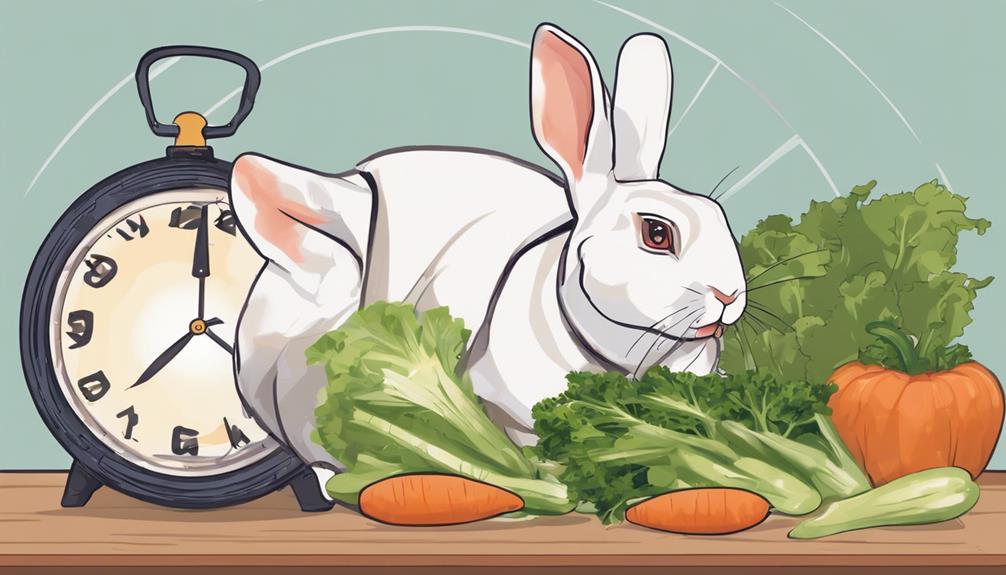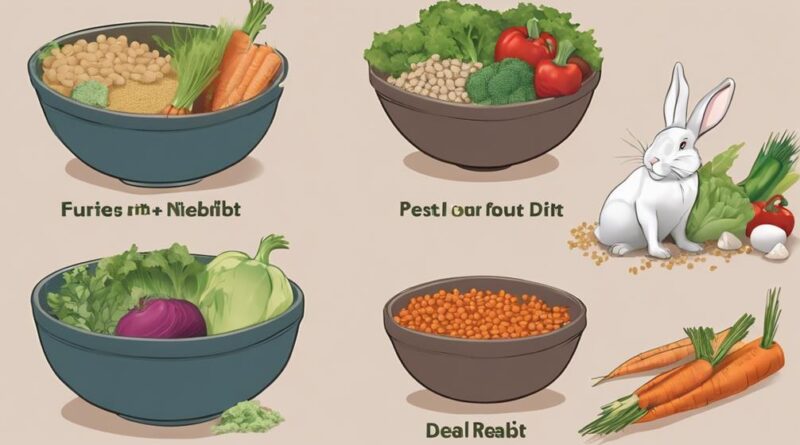Top 5 Ideal Diets for Your Pet Rabbit
Coincidentally, you may already be feeding your pet rabbit, but are you providing the top 5 ideal diets for their well-being? Understanding what to feed your furry friend can be crucial for their health and happiness.
From pellets to fresh vegetables and fruits, each component plays a vital role in their diet. However, there's one surprising item on the list that you might not have considered.
Stay tuned to uncover the unexpected addition that can truly elevate your rabbit's diet to the next level.
Pellets
When selecting pellets for your pet rabbit, opt for a high-quality brand that's specifically formulated for rabbits' nutritional needs. It's essential to consider your rabbit's fiber intake and ensure they receive a balanced nutrition from their pellets. Look for pellets that contain a high percentage of fiber, ideally around 18-25%. This fiber content is crucial for maintaining your rabbit's digestive health and overall well-being.
Ensure that the pellets you choose offer a balanced nutrition profile, including essential vitamins and minerals. A well-rounded diet is key to preventing nutritional deficiencies in your pet rabbit. Avoid pellets that are high in carbohydrates and low in fiber, as they can lead to obesity and digestive issues. Opt for pellets that are specifically designed for rabbits, as they're formulated to meet their unique dietary requirements.
When introducing pellets to your rabbit's diet, do so gradually to allow their digestive system to adjust. Start by offering small amounts and gradually increase the portion size over a week. Monitor your rabbit's consumption to ensure they're eating a sufficient amount without overindulging. By selecting high-quality pellets that prioritize fiber intake and balanced nutrition, you can provide your pet rabbit with a healthy and nutritious diet that supports their overall health and well-being.
Fresh Vegetables
To complement your rabbit's pellet intake, incorporate a variety of fresh vegetables into their diet to provide essential nutrients and enrich their overall nutritional intake. Leafy greens should make up a significant portion of your rabbit's vegetable consumption. Foods such as romaine lettuce, kale, and parsley are excellent choices. These leafy greens are packed with vitamins and minerals that are vital for your rabbit's health, including vitamin A and calcium.
Root vegetables are another essential component of your rabbit's diet. Carrots, beets, and radishes are tasty options that offer different textures and flavors to keep mealtime interesting for your furry friend.
When feeding your rabbit fresh vegetables, ensure that they're thoroughly washed to remove any pesticides or dirt that could be harmful. Introduce new vegetables gradually to prevent digestive upsets, and always monitor your rabbit's reaction to each new food. Remember that vegetables should make up around 10-15% of your rabbit's daily food intake, with the majority still coming from hay.
Fresh Fruits
Incorporate a variety of fresh fruits into your rabbit's diet to provide added nutrients and flavors that contribute to their overall health and enjoyment of meals. When feeding fruits to your rabbit, it's essential to ensure nutritional balance and practice portion control to prevent any digestive issues.
Here are five fruits that you can feed your pet rabbit:
- Apple: Rich in fiber and vitamins, apples are a great treat for your rabbit. Remember to remove the seeds before offering them a slice.
- Banana: High in potassium and antioxidants, bananas can be a tasty snack for your rabbit. Offer small pieces occasionally due to their sugar content.
- Strawberries: Packed with vitamin C and antioxidants, strawberries are a delicious and nutritious choice for your bunny. Moderation is key due to their sugar levels.
- Blueberries: These small fruits are rich in antioxidants and can be a healthy addition to your rabbit's diet. Offer them as an occasional treat.
- Pineapple: Pineapples contain bromelain, an enzyme that can aid in digestion. Offer small amounts of this tropical fruit to ensure your rabbit enjoys its benefits without overloading on sugar.
Water
Ensuring proper hydration for your pet rabbit is essential for their overall well-being and health. Hydration tips play a crucial role in maintaining your rabbit's health. Always provide fresh, clean water to your rabbit daily. Use a water bottle with a sipper tube to prevent contamination and spills, ensuring your rabbit has constant access to water. Check the water bottle daily to ensure it's working correctly and hasn't become clogged.
Rabbits can also get water from fresh vegetables like cucumber, lettuce, and celery. However, these shouldn't replace their main water source. Including these veggies in your rabbit's diet can help increase their water intake and add some variety to their diet. It's important to monitor your rabbit's water intake and ensure they're drinking enough to stay hydrated.
Water sources should be changed daily to prevent the growth of bacteria and algae. Clean the water bottle or bowl regularly with mild soap and water to prevent the buildup of slime and bacteria. Additionally, ensure the water is at room temperature, as rabbits may not drink cold water. By following these hydration tips and providing fresh water sources, you can help keep your pet rabbit healthy and happy.
Treats
Properly selecting and offering treats to your pet rabbit is vital for maintaining a balanced diet and promoting their overall well-being. When it comes to treats, opt for healthy snacks and use them as training rewards to keep your bunny happy and engaged.
Here are five ideal options to consider:
- Fresh Vegetables: Offer a variety of fresh veggies like carrots, bell peppers, and dark leafy greens. These not only add nutritional value but also provide essential fiber for your rabbit's digestive health.
- Herbs: Incorporate herbs like cilantro, parsley, or basil into your rabbit's diet. They're flavorful and low in calories, making them great for treating without causing weight gain.
- Small Fruit Portions: Occasional treats of fruits like apple slices, berries, or melon can be a tasty delight for your rabbit. Remember to feed these in moderation due to their natural sugar content.
- Hay-Based Treats: Hay-based treats such as timothy hay cubes or oat hay cookies are excellent for promoting dental health and keeping your rabbit entertained.
- Pellets: Use your rabbit's regular pellets as treats during training sessions. This ensures they receive a familiar taste while reinforcing positive behavior.
Avoid
When selecting treats for your pet rabbit, be cautious of high-sugar and high-fat options that can lead to health issues. Improper diets can pose significant health risks to your furry friend. Avoid feeding your rabbit foods that are high in sugar, as they can contribute to obesity and dental problems. Similarly, steer clear of high-fat treats that can lead to digestive issues and even more severe health complications.
Dietary mistakes are common when it comes to caring for rabbits. It's essential to avoid feeding your rabbit human foods like chocolate, sweets, or salty snacks, as these can be harmful to their health. Additionally, certain fruits and vegetables should be given in moderation due to their high sugar content. Always research which foods are safe for your rabbit to consume and consult with a veterinarian if you're unsure.
Feeding issues can arise when rabbits are given an improper diet. Ensure that your rabbit's main diet consists of hay, fresh vegetables, and a limited amount of pellets. Treats should only be given occasionally and in small quantities to prevent overeating. By avoiding high-sugar and high-fat treats, you can help your pet rabbit maintain a healthy diet and prevent potential health problems in the future.
Schedule

To maintain a balanced diet for your pet rabbit, establish a feeding schedule that includes regular mealtimes and appropriate portions. Consistency in feeding is essential for your rabbit's health and well-being.
Here are some key points to consider when setting up a feeding schedule for your furry friend:
- Feeding Frequency: Rabbits should have access to fresh Timothy hay at all times to support their digestive health. Additionally, provide a measured amount of high-quality pellets once a day to ensure they receive essential nutrients.
- Portion Size: When feeding alfalfa pellets, be mindful of portion sizes. Overfeeding can lead to obesity and other health issues. Follow the recommended guidelines based on your rabbit's size and weight.
- Timothy Hay: Incorporate Timothy hay into your rabbit's daily diet. It aids in digestion, keeps their teeth healthy, and provides essential fiber.
- Alfalfa Pellets: Alfalfa pellets are a good source of protein and calcium for growing or pregnant rabbits. However, for adult rabbits, Timothy-based pellets are a better option due to lower calcium content.
- Consistency: Stick to a consistent feeding schedule to help your rabbit establish a routine. Avoid sudden changes in feeding times or portions to prevent digestive upsets.
Frequently Asked Questions
Can Rabbits Eat Nuts and Seeds as Part of Their Diet?
Yes, rabbits can eat nuts and seeds, but it's essential to maintain a nutritional balance. These foods should be given in moderation to prevent digestive issues. Be mindful of potential allergies and always practice portion control.
Providing a variety of fresh hay, vegetables, and pellets is crucial for your rabbit's overall health. Remember, always consult with a veterinarian to ensure your pet's diet meets their specific needs.
How Important Is Hay in a Rabbit's Diet and How Much Should They Be Given Daily?
Hay is crucial for your rabbit's digestive health. It provides essential fiber that helps maintain proper gut function. Make sure to offer unlimited hay daily, as it should make up the majority of their diet.
Hay consumption aids in wearing down their teeth, prevents gastrointestinal issues, and keeps their digestive system running smoothly. Ensure your furry friend always has access to fresh hay to support their overall well-being.
Are There Any Specific Vegetables or Fruits That Rabbits Should Avoid Due to Potential Health Risks?
When it comes to your pet rabbit's diet, you need to be cautious about certain vegetables and fruits. Some foods like avocado, potatoes, and rhubarb can pose health risks due to their toxicity for rabbits. Avoid these toxic foods to keep your furry friend safe and healthy.
Always make sure to research what foods are safe and appropriate for your rabbit to prevent any potential harm.
What Are Some Common Signs That a Rabbit May Not Be Getting Enough Water?
If your rabbit isn't getting enough water, you might notice signs like decreased energy, dry skin, or sunken eyes.
To prevent dehydration, make sure fresh water is always available. Monitor water intake by checking the water bottle daily and considering a larger size if needed.
Encourage hydration by offering leafy greens and wet vegetables.
Is It Necessary to Provide Supplements or Vitamins to Ensure a Balanced Diet for Pet Rabbits?
To ensure balanced nutrition and maintain your rabbit's health, dietary supplements or vitamins may be necessary. These supplements can fill any nutritional gaps in your pet's diet.
However, it's crucial to consult with a vet before introducing any supplements to your rabbit's diet. They can recommend the right supplements and doses tailored to your rabbit's specific needs, promoting overall well-being and preventing any deficiencies.
Conclusion
Overall, providing your pet rabbit with a balanced diet is essential for their health and well-being. By incorporating pellets, fresh vegetables, fruits, and plenty of water into their daily meals, you can ensure they're getting the nutrients they need.
Remember to offer treats in moderation and avoid certain foods that can be harmful to rabbits. Creating a consistent feeding schedule will help your furry friend thrive and lead a happy, healthy life.
